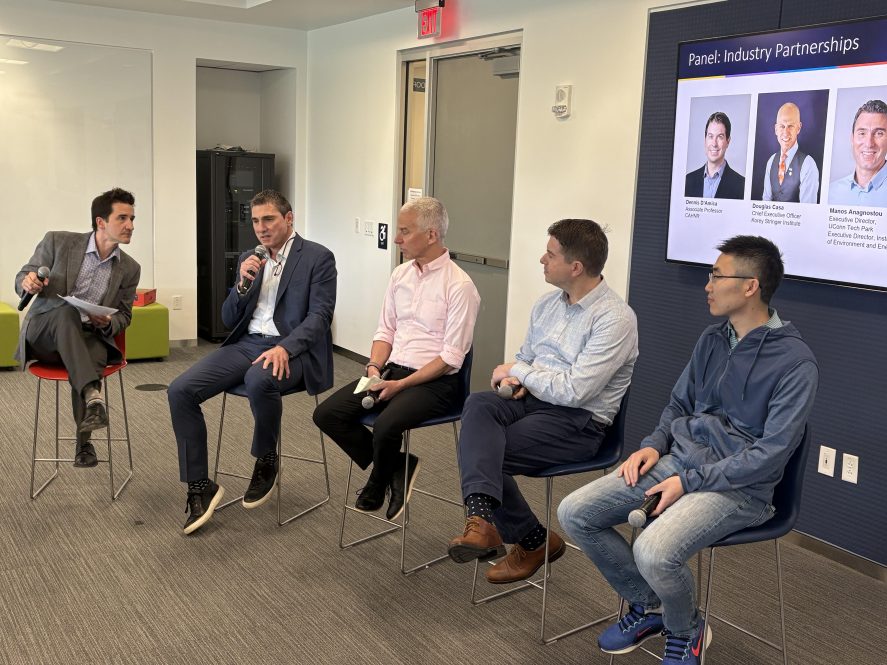Successful UConn researchers offer Insight on fruitful collaboration with private industry

UConn Tech Park Business Development Manager Michael DiDonato, left, moderates a panel including Tech Park Executive Director Emmanouil Anagnostou, CEO of the Korey Stringer Institute Douglas Casa, Associate Professor of Animal Science Dennis D'Amico, and innovation and entrepreneurship Assistant Professor Mingyu Qiao.
Private industry relies on universities like UConn to conduct important research that benefits the sponsoring company as well as academic experts. But forging those partnerships can be difficult, especially for individuals and startups looking to make an impact.
On May 8, UConn Tech Park played host to "How to Partner with Industry," a seminar and panel discussion designed to give University researchers and entrepreneurs insight on making those valuable connections.
"You don't need to have an entrepreneurial mind to do a partnership with industry," said Emmanouil Anagnostou, the Tech Park's executive director as well as the Institute of the Environment and Energy. "Don't think that you have to go way outside of your comfort zone to create industry programs."
The event reflected UConn's partnerships with some of Connecticut's largest and most influential companies, many of which sponsor centers and institutes within the Tech Park. The seminar offered advice on how to form partnerships with large companies as well as working with small and medium-sized businesses for mutual benefit.
More than 70 people attended the seminar, including 50 members of UConn's faculty. The attendees were advised to seek advocates to help propel them into commercial enterprise, drawing from alumni networks, the UConn Foundation, and the expert staff at Technology Commercialization Services, the wing of UConn's research enterprise dedicated to tech transfer.
The Tech Park offered a panel of successful researchers experienced with successful partnerships with industry. They included Anagnostou; Dennis D'Amico, an associate professor of animal science; Douglas Casa, a Board of Trustees Distinguished Professor of Kinesiology and CEO of the Korey Stringer Institute; and Mingyu Qiao, an assistant professor of innovation and entrepreneurship in the Department of Nutritional Sciences.
All the panelists have conducted extensive independent or collaborative research. They advised on effective partnerships, including the ability to work with a company to mutually develop ideas.
Anagnostou advised that the goal is not always solely individual success.
"You can still be within the boundaries of your work and your lab," Anagnostou said. "Simply change the mode of operation: Instead of looking at the merit of your ideas, look at the merit of your solution."
D'Amico exemplifies the point. A renowned food scientist specializing in dairy products, he is not seeking to establish his own business but rather works with artisans throughout the region to help them maximize their own output and quality.
"You don't need a tech park for small batch cheesemaking," D'Amico said. "Most of my work is in applied research. Cheesemakers would have needs and questions, so I started building relationships with them to help provide answers."
Qiao, meanwhile, had already disclosed three of his own inventions before joining the UConn faculty. He advised that maintaining control of intellectual property is crucial, which includes understanding what ideas and concepts lend themselves to business ventures.
"Good inventions that can be commercialized do not need to be original or very complicated," Qiao said. "It can be something simple you can start, as long as you can get some protection, and then you can continue to build on that."
While the Korey Stringer Institute has many high-profile clients, including the NFL, Casa said that small and medium-sized businesses are more likely to reach out into academic circles to assist with research. Those companies don't have the capital to invest in their own facilities and staff, so partnering with university researchers is a more practical approach.
"You have to get out of academic circles into areas where industry is hanging out, then pull them into academic area," Casa said.






